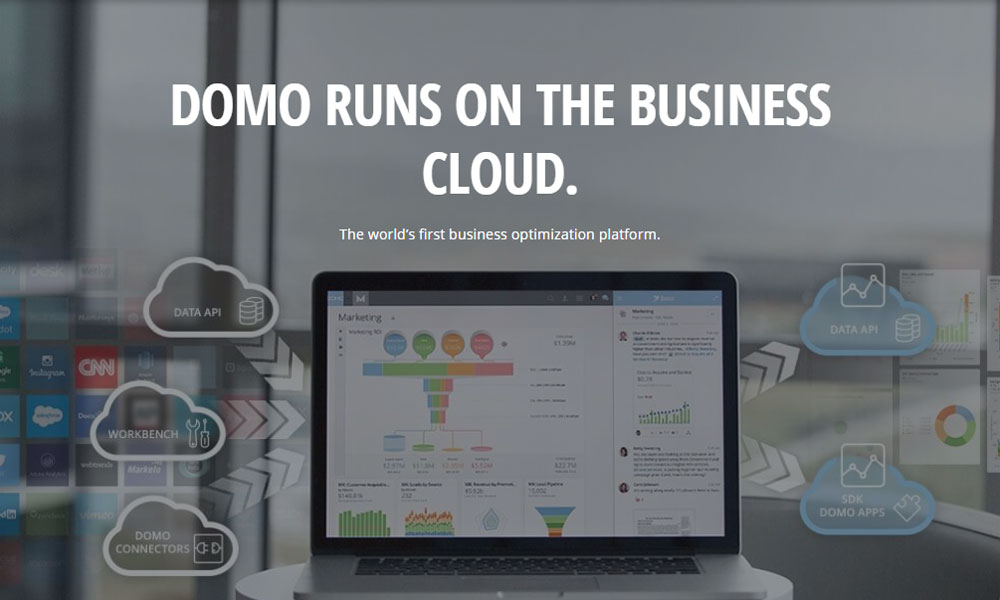You may have seen the recent announcement that Stellar Consulting Group has been named New Zealand’s first certified partner for the Domo Business Cloud. We’d like to share with you some of the reasons we’re so excited to be working with Domo.
What is Domo?
Domo is a complete SaaS analytics platform. It includes its own ETL tool, columnar data storage, data presentation, security, collaboration, 3rd party market-place, R integrations and natural language queries.
With Domo, you can view data from virtually any source (there are literally hundreds of connectors available off-the-shelf) and in real-time. Data can easily be shared, discussed, and acted upon, using the built-in collaboration tools.
Domo was founded in 2010 by Josh James who, four years earlier, had co-founded the successful web analytics company Omniture (later acquired by Adobe). With Domo, he set out to help CEOs and other leaders change the way they do business and obtain value from their data.
Based in Utah, Domo is now a critical component of decision-making at companies as diverse as DHL, Mastercard, eBay and National Geographic.
Stellar’s perspective on Domo
Steve Smith, a Senior Consultant at Stellar, recently completed intensive training with Domo in Australia. We asked him what he finds particularly exciting about Domo:
What I really like is that it makes our customers self-sufficient. It’s a self-service environment. Even if you have a tonne of data, it’s often a one-click solution.
Loading and manipulating data is so much easier; all of that long, laborious and difficult setup and building of models and ETLs just goes away. You’re left with: 1) get the data in, and 2) let’s get some value from it!
But Domo is also incredibly powerful, so there must be some elements that require expert support?
Sure. You can go all the way from pre-built data connectors to workflows that use SQL and tables with indexes, doing fairly complex data transfers. The tools are available at different levels, depending on the requirements, or how technical the customer is and the level of control they feel they need.
During the training we had a really good spread of experience including marketing people who weren’t technical, all the way up to full-blown BI consultants. But even after we had learned the technical details, everyone was still saying “Yeah, but I’d only use that if I absolutely had to.” The standard tools are very visual and intuitive.
So it’s really easy for users to get into, and it has some cool visualisations. Any other features that caught your eye?
With the Domo app, you can have all your dashboards on your mobile device. It’s interactive – whatever you can do on the desktop you can do in the app. So it lets people get into their data remotely. You can also interact with colleagues using Domo Buzz, inviting people to discuss a particular chart, for example.
At Stellar, we like to ask a lot of questions when we start working with a client and really understand their needs. Will it be the same when the customer is using Domo?
Yes, but with Domo, it’s just really easy to jump in. Our goal is to get the customer started with some data feeds and sample dashboards. First, of course, we work with them to identify their business questions and find the supporting levers to answer those questions. We also help them set up the roles that are required to maintain and govern Domo.
At that point, we take a step back, so that we are effectively only an escalation point for the Domo “owners” in the business, there to guide usage of the platform.
It sounds like the advisory services that Stellar provides will remain essential, then.
Part of the process is identifying three people to take responsibility for Domo in the organisation. There’s the Executive Sponsor, the Data Specialist, and then a role that falls into both camps that’s called the “Major Domo”. That third person is the glue between the other two, but also owns the governance of the programme, and helps role out initiatives like maintaining the dataset and organising training.
So, what sort of organisations should consider using Domo?
I think Domo would be appealing for any type or size of business. When you look at the ROI, Domo offers a fast and flexible solution, which may well make a lot of sense, even for very small operations.
Domo allows companies to get answers from their data faster, in a collaborative and easy to understand way. I’m looking forward to helping our customers work with Domo!





